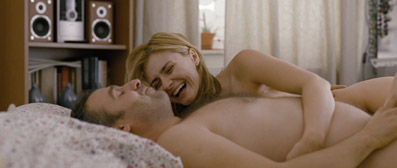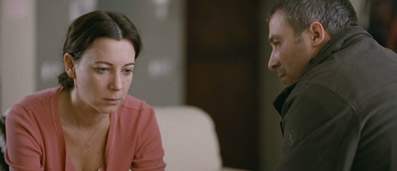| |
"Anthropologist Margaret Mead once suggested that monogamy is the hardest of all human marital arrangements. It is also one of the rarest. Even long-married, faithful couples are new at monogamy, whether they realise it or not. In attempting to maintain a social and sexual bond consisting exclusively of one man and one woman, aspiring monogamists are going against one of the deepest seated evolutionary inclinations with which biology has endowed most creatures, Homo sapiens included." |
| |
David P. Barash – The Myth of Monogamy:
Fidelity and Infidelity in Animals and Humans |
There's quite a bit of hypocrisy surrounding the subject of infidelity. Studies conducted during the past year alone, for example, suggest that something like 90% of Americans believe that infidelity is morally wrong, but that between 30% and 60% have been unfaithful to their current or past partners. This last figure, I would suggest, is hardly surprising. If there is a perfect partner out there somewhere for each of us, the chance that we've actually found them or will even ever meet them are mathematically remote. Relationships are thus born of a pleasing combination of comfort, attraction, and shared beliefs and interests, and become romanticised by nonsense about life partners and soul mates. They also require a wilful suppression of the very biological drive that drove us to hunt out a mate in the first place. As David Barash suggests in his above quoted work, "The monogamous family is most definitely under siege, and not by government, not by a declining moral fibre, and certainly not by some vast homosexual agenda [I'll interrupt Mr. Barash here to point out that gay men and women have also been known to cheat on their partners] but by the dictates of biology itself. Infants have their infancy. And Adults? Adultery."

Research also suggests that in sizeable proportion of cases (it would be pushing it to claim a majority) these affairs go undiscovered. This may be a good thing, as it's when the truth is revealed that relationships take a swan-dive into the toilet. Love turns to anger and friends get to choose sides and pass ill-informed judgement, particularly if there are children involved. When a couple breaks up just about everyone else knows what's best for their kids, even those who've never had any of their own. For both sides the experience can be emotionally devastating. It's little wonder that divorce ranks second only to the death of a spouse on the famed Holmes and Rahe Stress Scale, closely followed by marital separation, imprisonment, and the death of a close family member, every one of them hugely life-changing experiences.
It's the emotional impact of an affair-triggered break-up that is central the innocuously titled Tuesday, After Christmas [Marți, după Crăciun], the latest film to land on UK DVD from Romanian director Radu Muntean, whose 2008 Boogie is many ways Tuesday's stylistic and thematic bedfellow. In both films a seemingly settled family man is prompted to question his concept of familial normality by his willing involvement with potentially relationship-damaging others. In Boogie, a chance encounter with two close friends from high school sends contented husband and father Bogdan on a night out with the boys in an attempt to revisit and recapture the carefree days of his misspent youth. This initially drives a wedge between him and his wife Smaranda but ultimately sees him put aside such youthful desires and re-embrace family life. This was seen by some as evidence that Bogdan had somehow matured from the experience and finally laid to rest the follies of youth. For others (myself included) it played more like a commentary on what we are prepared to trade in for stability, emotional security and social conformity. Re-watching it after Tuesday, it seems more likely that it was intended as a sly blend of both.
In Tuesday, After Christmas, the main man is Paul (engagingly played by Muntean regular Mimi Branescu), who although still in love with his wife Adriana has been having a long-standing affair with the younger Raluca. But Raluca has become a little weary of having to share Paul with Adriana, and Paul has to decide which of the two women he really wants to be with. And that, save for the fine detail of how this plays out, is the plot in a nutshell.

As anyone familiar with Boogie will be aware, Muntean is more interested in character than story, and here the decision facing Paul is a lot less important than its emotional impact on those it will directly affect. Stylistically, the film follows Boogie's lead, with entire scenes covered in single long takes in which characters do little but converse. This may sound like a recipe for well-meaning boredom, but it proves quietly captivating from the opening scene, a post-coital chat between Paul and Raluca that initially sets them up as a regular couple (the relaxed nudity and easiness with each other is disarmingly authentic), the true nature of their relationship gradulally becoming apparent from the small detail of the conversation that follows. In the very next scene Paul is out shopping with Adriana for Christmas presents and there's no sign that the two are anything but content. Remove the footage of Paul with either of the two women and you'd be left with a portrait of a man who is settled and happy with his chosen partner, whichever of the two she may be.
In common with Boogie, the film follows events exclusively from the viewpoint of our leading man, but dispassionately so, observing rather than supporting or condemning his actions. We go where he goes and we only witness encounters in which he is directly involved. And yet likeable though he is, for the most part Paul remains an emotionally closed book, his true feelings hidden behind a surface affability that changes little whether he's with Raluca or Adriana. As a result, despite being presented from Paul's viewpoint, it's how the situation affects Raluca and Adriana that is the real meat of the film.
This first really hits home in a beautifully handled scene in which Paul accompanies daughter Mara on a trip to the dentist – who turns out to be Raluca – and is unexpectedly joined by Adriana, the first and only time that husband, wife, daughter and lover are observed in the same location. At this point, Adriana is blissfully unaware of her husband's infidelity, and with Paul wearing his emotional mask it's Raluca's increasingly painful discomfort that becomes the scene's raison d'être, brilliantly conveyed through the subtly shifting facial expressions of actress Maria Popistasu (another rising female star of New Romanian cinema, who like Anamaria Marinca of 4 Months, 3 Weeks and 2 Days, was first seen here in the TV drama Sex Traffic). But the biggest emotional blow is delivered immediately after Paul tells Adriana about the affair, an unbroken twelve minute shot in which actress Mirela Oprisor moves from quiet disbelief to indignant fury with such gut-wrenching conviction that you you can't help but feel like you're trapped in the room with two friends as they break up for real. It's also the first time that Paul allows his feelings to surface, in his physical reaction to Adriana's anger and in an extraordinary moment in the sequence that follows in which he tenderly touches Adriana's face, an action that triggers not anger but a heartfelt flood of tears.

In this focus on how Paul's actions affect both Raluca and Adriana (and in one telling scene, Raluca's disapproving mother) the film so easily could have taken a judgemental stand, but it steadfastly refuses to do so. Paul is never portrayed as selfish or uncaring, just a man who has found himself in love with two women and is unwilling to sacrifice one for the other. Whether he was led by his loins or the same mid-life longing for the pleasures of youth that Bogdan ultimately turned his back on in Boogie is never confirmed and is likely irrelevant to Muntean's intentions. Tuesday, After Christmas is not about why affairs take place but the disruption and pain that results from their disclosure. Compellingly and sometimes painfully truthful, it will ring some discomforting bells for anyone who has found themselves in this situation (do I really need to qualify that claim in more detail?) and will provide little comfort for those currently planning to come clean to their partners. And yet much like many a real-world equivalent, even when love has been replaced by angry contempt, the long-term bonds of mutual understanding are not so easy to cut. This is deftly captured in the final sequence when Adriana secretively passes Mara's Christmas present to Paul to place with the others, an almost throwaway moment that speaks volumes about the nature of couple's relationship and their still instinctive need to do right by their daughter.
A clean and crisply detailed 2.35:1 anamorphic transfer with spot-on contrast and generally naturalistic colour, and that copes equally well with daylight-bathed white-walled apartments and lamp-lit night exteriors without any noticeable variance in the picture integrity. A very pleasing transfer.
The Dolby 2.0 stereo soundtrack is not quite as polished. With no music score or explosive action to really push the volume it's down to how well it handles the dialogue and ambient sound. Clarity and tonal range are consistently impressive, but the stereo mix is not always on the ball. The spread of the dialogue is sometimes a little wide – the voice of a character sitting left of centre can appear anywhere from the centre speaker to the extreme left of the sound stage, which can physically distance dialogue from the person delivering it (intriguingly, this spread is also on the extra feature). In a couple of short sequences the placement is even reversed, with the voice of a character on screen left appearing on the right, and vice versa. Otherwise, fine.
Interview with director
Director and co-screenwriter Radu Muntean engages in a lively and always interesting chat in English with critic film writer Mihai Chirilov about how he got into film (watched and swapped movies on VHS and not talented enough to be a footballer), why it took so long to make his first feature, and his approach to film storytelling. Appropriately, the focus then shifts to Tuesday, where Muntean discusses the different structural approaches that were considered at an early stage, and his hope that the film would be a starting point for an audience to imagine their own movie with the characters and situation. He cites the break-up scene as the most difficult of the film (it's also the longest single shot) and the sequence that follows as the most emotional to direct, while Chirilov highlights the dental visit as the most pivotal scene.
Booklet
An overview of the film and a well targeted interview with director Muntean by New York based curator and critic Damon Smith.
I liked and admired but had reservations about Boogie, but what worked there really works here, and returning to the earlier film after watching Tuesday, After Christmas gave me a new appreciation of its handling and intentions. It's quite possible my stronger connection with Tuesday, After Christmas stems from experience-driven empathy, but general opinion has this as Muntean's most impressive film to date, and I'm with the crowd on this one. Second Run's DVD features a fine transfer, a decent if oddly mixed soundtrack, and two very worthwhile interviews with the director. Recommended.
|